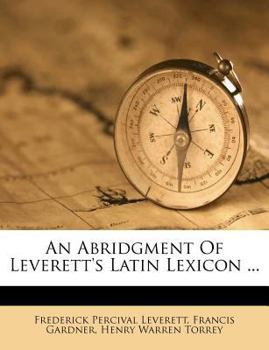An Abridgment Of Leverett's Latin Lexicon ...
"An Abridgment Of Leverett's Latin Lexicon" is a comprehensive reference work designed to aid students and scholars in their study of the Latin language. A condensed version of the larger, more detailed lexicon, this abridgment retains the essential definitions and usages necessary for understanding classical Latin texts. Compiled by Frederick Percival Leverett, Francis Gardner, and Henry Warren Torrey, this lexicon serves as an invaluable tool for those seeking to enhance their vocabulary and comprehension of Latin literature and historical documents.
This edition offers a practical and accessible resource, making it suitable for both classroom use and independent study. Its enduring value lies in its ability to unlock the nuances of the Latin language, providing clarity and insight into the writings of ancient Roman authors and thinkers. Whether used by students, educators, or lifelong learners, "An Abridgment Of Leverett's Latin Lexicon" remains a crucial aid in the exploration of classical culture and thought.
This work has been selected by scholars as being culturally important, and is part of the knowledge base of civilization as we know it. This work was reproduced from the original artifact, and remains as true to the original work as possible. Therefore, you will see the original copyright references, library stamps (as most of these works have been housed in our most important libraries around the world), and other notations in the work.
This work is in the public domain in the United States of America, and possibly other nations. Within the United States, you may freely copy and distribute this work, as no entity (individual or corporate) has a copyright on the body of the work.
As a reproduction of a historical artifact, this work may contain missing or blurred pages, poor pictures, errant marks, etc. Scholars believe, and we concur, that this work is important enough to be preserved, reproduced, and made generally available to the public. We appreciate your support of the preservation process, and thank you for being an important part of keeping this knowledge alive and relevant.
Related Subjects
History




